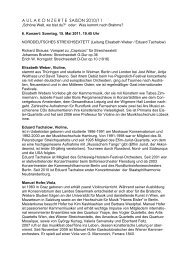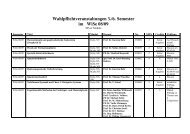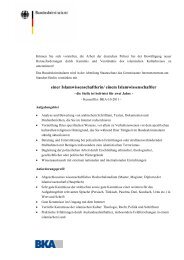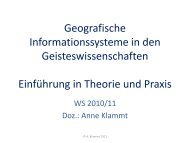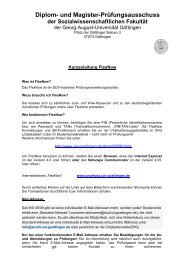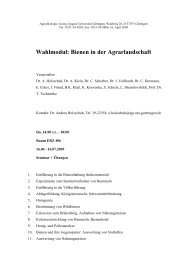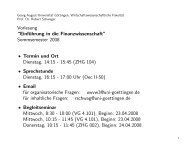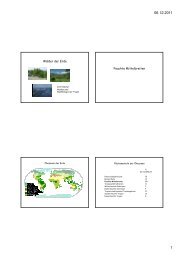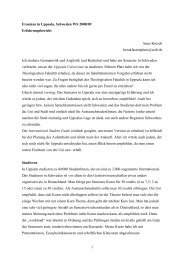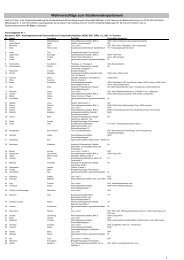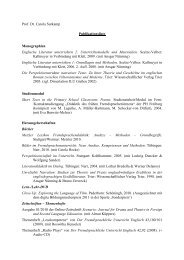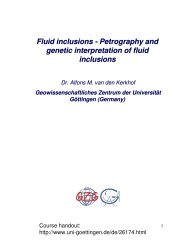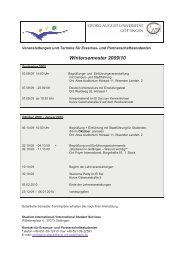The OMC inclusion and national social NGOs: From enthusiasm to ...
The OMC inclusion and national social NGOs: From enthusiasm to ...
The OMC inclusion and national social NGOs: From enthusiasm to ...
Create successful ePaper yourself
Turn your PDF publications into a flip-book with our unique Google optimized e-Paper software.
Friedrich, D., 2006, Policy Process, Governance <strong>and</strong> Democracy in the EU: the Case of the OpenMethod of Coordination on <strong>social</strong> <strong>inclusion</strong>. Policy & Politics, 34 (2), 367-383.Geyer, R., 2001, Can European Union <strong>social</strong> <strong>NGOs</strong> co-operate <strong>to</strong> promote EU <strong>social</strong> policy?Journal of Social Policy, 30(3), 477-493.Huster, E-U. et al, 2004, Implementation of the National Action Plan of Germany against Poverty <strong>and</strong>Social Exclusion (NAPincl) on the Regional <strong>and</strong> Local Level. Second Report 2004 of theNon-governmental Experts, Oc<strong>to</strong>ber 2004.Kröger, S., 2005, “Coming <strong>to</strong> grips with soft governance: a conceptual framework foranalysing the Open Method of Coordination in the field of poverty <strong>and</strong> <strong>social</strong> exclusion”,Paper prepared for the Summer School 2005 of the Postgraduate Programme »<strong>The</strong> Future ofthe European Social Model«, University of Göttingen, 18th <strong>to</strong> 21rst July.Kröger, S., 2006a, "When Learning Hits Politics Or: Social Policy Coordination Left <strong>to</strong> theAdministrations <strong>and</strong> the <strong>NGOs</strong>?" in: European Integration online Papers, 10 (3).Kröger, S., 2006b, Do numbers induce learning? Assessing the Laeken indica<strong>to</strong>rs of the Open Methodof Coordination. Forthcoming in Göttinger Diskussionsreihe zum Europäischen Sozialmodell,1 (1).Maucher, M., 2005, <strong>The</strong> involvement of German third sec<strong>to</strong>r organisations in processes ofdecision making with a European dimension. Discussion paper presented at the TSEPWorkshop on „<strong>The</strong> third sec<strong>to</strong>r <strong>and</strong> the European multi-level process “, Berlin, 1 st - 2 nd April2005 . To be found at www.lse.ac.uk/collections/TSEP.Miebach, M., When <strong>OMC</strong> hits home. London School of Economics <strong>and</strong> Political Science . How do theUnited Kingdom <strong>and</strong> Germany work with the Open Method of Coordination in the area of<strong>social</strong> <strong>inclusion</strong> domestically? Dissertation submitted in partial fulfilment of the requirementfor the degree of MSc European Social Policy, September 2004.Offe, Claus, 1998, „Demokratie und Wohlfahrtsstaat: Eine europäische Regimeform unter dem Stressder europäischen Integration“, in: Streeck, Wolfgang (Hg.) Inter<strong>national</strong>e Wirtschaft,Nationale Demokratie, Herausforderungen für die Demokratietheorie,Frankfurt: Campus, 99-136.Rhodes, Martin, 1999, An Awkward Alliance: France, Germany <strong>and</strong> Social Policy’ in D. Webber(ed.), <strong>The</strong> Franco-German Relationship in Europe: <strong>The</strong> Hard, the Hollow or the RottingCore?, London: Routledge, 131-148.Sacchi, S., 2004, New Modes of Governance in the EU <strong>and</strong> Italy’s Institutional Capability. AComparison of Employment <strong>and</strong> Social Inclusion Policies. Rivista Italiana di PolitichePubbliche, 3, 5-35.Saurugger, S., 2004, Representative versus Participa<strong>to</strong>ry Democracy? France, Europe <strong>and</strong> CivilSociety. Paper presented at the ECPR Joint Sessions of Workshops, University of Uppsala,Sweden, 13-18 April 2004.



